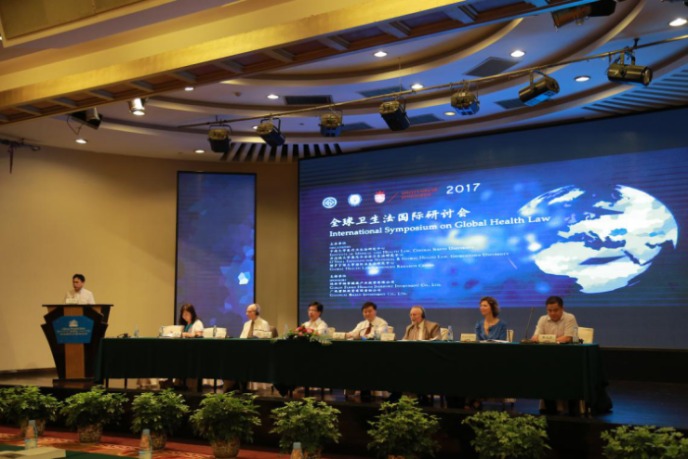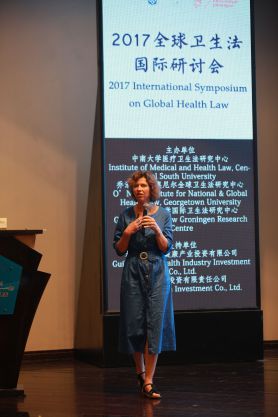Guilin, 2017: China Hosts Country’s First International Symposium on Global Health Law
| Date: | 08 August 2017 |
| Author: | GHLG Blog |
By Yi Zhang (Eva), University of Groningen Faculty of Law, PhD Candidate, yi.zhang@rug.nl
In order to further promote the level of global health governance and encourage research in global health law, the 2017 International Symposium on Global Health Law was held in Guilin city, China from July 2nd to July 3rd, 2017. The organizer of the symposium was Central South University, China. The symposium was hosted jointly by the Institute of Medical and Health Law of Central South University, the O’Neill Institute for National & Global Health Law of Georgetown University, and the Global Health Law Research Centre of the University of Groningen (GHLG).

The theme of this symposium was “Global medical health and relevant legal issues”. Altogether, over 80 academic papers were accepted, and more than 80 experts from all over the world from colleges, universities, research institutes, and law practice departments attended the symposium and shared a comprehensive discussion on the abovementioned theme. The experts were from Central South University, China; Georgetown University, US; Groningen University, the Netherlands; Yale University, US; Harvard University, US; Temple University, US; Hokkaido University, Japan; Taiwan University, China; Tsinghua University, China; and Peking University, China.
The Director of the Office of International Cooperation and Exchange, Yi Bai, stated in his address that 2017 was an important year to carry out the theme of National Health and Wellness and to carry through the “13th five-year plan” of deepening the health care system reform in China. He also emphasized that it is the key year to construct the basic framework of a proper functioning medical and health care system and to accomplish staged tasks of reforming the pharmaceutical and health care system in China. It can be predicted that holding the first International Symposium on Global Health Law would promote the development of global health law research in China.
Throughout the symposium, expertise were shared on global health issues including discussions on disease prevention and treatment, global health governance, international law and human rights in health protection, and national policy approaches to health-related issues such as drunk-driving, tobacco, health insurance, and access to medicines.

In their academic summary, Central South University Xiangya School of Public Health Professor Guoqing Hu said of the symposium that it was, on one hand, a real interdisciplinary crossing had been realised at the symposium with each paper having its own special value; on the other hand, through taking advantage of every subject and international communication, new challenges and problems home and abroad had been explored.
At noon on July 3rd, 2017, after a day and a half of heated discussion, the closing ceremony was held. University of Groningen Prof Brigit Toebes hereby functioned as the host. In her speech, she praised the huge success of the symposium, and she took great pleasure in seeing that many famous scholars from different countries were invited to attend the symposium and that over 80 professors assembled at the symposium to have an in-depth discussion of global health law issues. She was inspired by the speeches of each individual expert, and accordingly made a wonderful comment on the symposium with ten questions to share with the delegates and to cast light for the future global health law research,:
(1) What is global health law; what are its scope and implications?
(2) What are the roles and positions of human rights, ethics, governance, and other related disciplines in global health law?
(3) What are the implications of global health law for domestic health care settings?
(4) What can we learn from other countries when it comes to ‘good practice’ in domestic health laws?
(5) How can we measure the effectiveness of health laws in a transdisciplinary manner?
(6) How do we balance care and prevention?
(7) How can health insurance best be organized and what can we learn from countries like Japan, Taiwan, and the Netherlands: public, private, or a mix?
(8) Against the backdrop of an aging population, the rising cost of medicines and care, and the increase in non-communicable diseases, how can costs be reduced whilst maintaining equality in access to care?
(9) How may overconsumption of medical services be reduced?
(10) How can health lifestyles be encouraged, while e paying due attention to the autonomy, privacy, and self-determination of individuals?
Finally, Prof Yunliang Chen delivered a closing speech, and he concluded that a great power must participate in global health governance and the research on global health law was a major demand for China. He also wished the participants would strengthen global health law research to promote global health governance in China.


Your comment